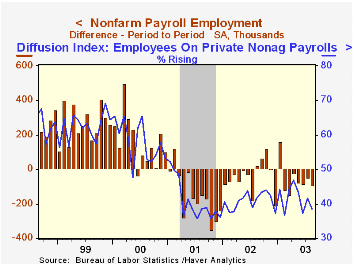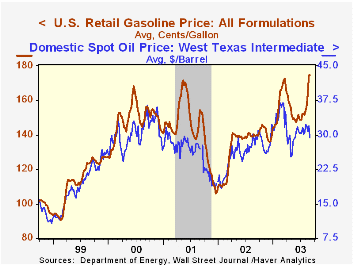 Global| Sep 05 2003
Global| Sep 05 2003U.S. Nonfarm Payrolls Fell Unexpectedly
by:Tom Moeller
|in:Economy in Brief
Summary
Nonfarm payrolls fell 93,000 in August and the previously reported declines in June & July were deepened. Consensus estimates had been for a modest 15,000 worker rise in August payrolls. It was the seventh monthly decline in payrolls [...]

Nonfarm payrolls fell 93,000 in August and the previously reported declines in June & July were deepened. Consensus estimates had been for a modest 15,000 worker rise in August payrolls. It was the seventh monthly decline in payrolls this year. Since December payrolls have fallen 437,000 (0.3%).
Declines in manufacturing sector payrolls continued. They have fallen in every month since July 2000 and are down 2.729 million (15.8%) during that period. Service producing jobs fell 67,000 (-0.1%) for the fifth decline this year. Government sector jobs fell 26,000 and declines were widespread in other service industries.
From the separate household survey, the unemployment rate fell modestly to 6.1% versus expectations for no change. Employment rose 147,000 (0.6% y/y) and the labor force fell 10,000 (1.0% y/y) following the sharp 556,000 July drop.
The workweek was unchanged at 33.6 hours. The decline in employment and an unchanged workweek pulled the index of aggregate hours worked in private industries down 0.1% following a 0.4% decline in July. So far in 3Q, hours worked are down 0.5% from 2Q during which they declined by a similar amount.
The one-month diffusion index for private nonfarm payrolls fell to 38.5, near the cycle low. This low breadth of change measure bodes poorly for a near term pickup in hiring activity.
Average hourly earnings rose a less than expected 0.1%, the slowest increase since April.
New research from the Federal Reserve Bank of New York titled "Has Structural Change Contributed to a Jobless Recovery?" can be found here .
| Employment | Aug | July | Y/Y | 2002 | 2001 | 2000 |
|---|---|---|---|---|---|---|
| Payroll Employment | -93,000 | -49,000 | -0.4% | -1.1% | 0.0% | 2.2% |
| Manufacturing | -44,000 | -59,000 | -4.2% | -6.9% | -4.8% | -0.3% |
| Average Weekly Hours | 33.6 | 33.6 | 33.9 | 33.9 | 34.0 | 34.3 |
| Average Hourly Earnings | 0.1% | 0.3% | 2.9% | 2.9% | 3.8% | 3.9% |
| Unemployment Rate | 6.1% | 6.2% | 5.8% | 5.8% | 4.8% | 4.0% |
by Tom Moeller September 5, 2003

Retail gasoline prices were about unchanged last week at a record $1.74 per gallon, up 25.3% y/y.
Lean inventories of gasoline, supply disruptions at refineries due to the August Power Blackout and hot summer temperatures have contributed to the rise in gasoline prices.
Crude oil prices have moved in the other direction. The price of West Texas Intermediate crude was $29.43 per barrel last week (5.9% y/y) versus a June high near $32.00 and a March high near $37.00. Prices have fallen slightly further this week.
Wholesale natural gas prices were roughly stable last week at $5.04/mmbtu, down from the cold-weather spike over $12.00 in late February but still up by more than half from last year.
For the latest Short Term Energy Outlook from the US Department of Energy click here.
| US Retail Gasoline Prices | 04/07/03 | 12/30/02 | Y/Y | 2002 | 2001 | 2000 |
|---|---|---|---|---|---|---|
| All Formulations ($/Gal.) | $1.63 | $1.44 | 15.4% | $1.34 | $1.42 | $1.48 |
Tom Moeller
AuthorMore in Author Profile »Prior to joining Haver Analytics in 2000, Mr. Moeller worked as the Economist at Chancellor Capital Management from 1985 to 1999. There, he developed comprehensive economic forecasts and interpreted economic data for equity and fixed income portfolio managers. Also at Chancellor, Mr. Moeller worked as an equity analyst and was responsible for researching and rating companies in the economically sensitive automobile and housing industries for investment in Chancellor’s equity portfolio. Prior to joining Chancellor, Mr. Moeller was an Economist at Citibank from 1979 to 1984. He also analyzed pricing behavior in the metals industry for the Council on Wage and Price Stability in Washington, D.C. In 1999, Mr. Moeller received the award for most accurate forecast from the Forecasters' Club of New York. From 1990 to 1992 he was President of the New York Association for Business Economists. Mr. Moeller earned an M.B.A. in Finance from Fordham University, where he graduated in 1987. He holds a Bachelor of Arts in Economics from George Washington University.
More Economy in Brief
 Global| Feb 05 2026
Global| Feb 05 2026Charts of the Week: Balanced Policy, Resilient Data and AI Narratives
by:Andrew Cates






